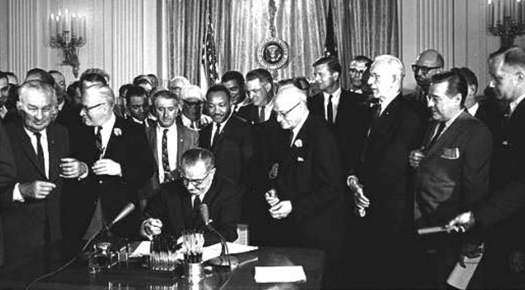
After three years of working on the report which will resolve ultimate conflicts over belief and identity, U.S. Commission on Civil Rights (USCCR) is not even close to the solution of that problem. They produced a report, on 27 pages and over 200 additional pages of commentary and they came to this conclusion - legal language is not sufficient to resolve ultimate conflicts over religious freedom and non-discrimination. We have two important concepts here – religious liberty and civil rights – two competing cultural norms. Let’s try to define those two concepts.
Civil rights are the rights of individuals to receive equal treatment (and to be free from unfair treatment or "discrimination") in a number of settings -- including education, employment, housing, and more -- and based on certain legally-protected characteristics. Most laws guaranteeing and regulating civil rights originate at the federal level, either through federal legislation, or through federal court decisions (such as those handed down by the U.S. Supreme Court). States also pass their own civil rights laws (usually very similar to those at the federal level), and even municipalities like cities and counties can enact ordinances and laws related to civil rights.
Freedom of religion or freedom of belief is a principle that supports the freedom of an individual or community, in public or private, to manifest religion or belief in teaching, practice, worship, and observance. It also includes the freedom to change one's religion or belief. Freedom of religion is considered by many people and nations to be a fundamental human right. In a country with a state religion, freedom of religion is generally considered to mean that the government permits religious practices of other sects besides the state religion, and does not persecute believers in other faiths.
The difference anyone can observe at first sight is that civil rights are based on certain legally-protected characteristics and freedom of religion is considered to be a fundamental human right. The question is – isn’t civil rights also a fundamental human rights and should religious freedom also be protected by law? That is something the U.S. Commission on Civil Rights’ report attempted to respond.
In recent years, the court systems often face problems on this issue. Supreme Court decisions on birth control and gay marriage have highlighted religious dissent on issues of sexuality and gender identity, but recent conflicts are even bigger. The USCCR was created nearly 60 years ago because of the resolution of controversial issues and it still doesn’t have the answer about religious liberty. Most participants in the debate agreed that religious liberty, which includes classification by sex, race, national origin etc. can seriously undermine human rights. That stance refers to some examples from everyday life where many people “in the name of faith” refuse to provide their services or don’t accept necessary medical treatments (religious pharmacists who decline to stock certain kinds of birth control in their stores).
The Commission was created with the intention to unite diametrically opposing political viewpoints but their disagreements in the report go beyond their political views.
The Commission’s chair, Martin Castro wrote: “The phrases ‘religious liberty’ and ‘religious freedom’ will stand for nothing except hypocrisy so long as they remain code words for discrimination, intolerance, racism, sexism, homophobia, Islamophobia, Christian supremacy or any form of intolerance.”
Another Commissioner, Peter Kirsanow, wrote that religious liberty is an undisputed constitutional right. With the exception of racial nondiscrimination principles embedded in the Thirteenth, Fourteenth, and Fifteenth Amendments, nondiscrimination principles are statutory or judicially created constructs.
United States law holds that free expression of religion and identity are both important. There’s no easy formula for pre-determining when each should be given precedence, particularly when they clash in fundamental ways. The Commission’s recommendations can amount to this: religious exemptions can’t limit the freedom of others; the federal government should consider clarifying its Religious Freedom Restoration Act and overly-broad religious exemptions can create problems. This report still didn’t precisely define how the law should be applied in individual cases, and the conclusion is that the court decisions will depend on the personal views of the jury in any particular case.
Photo Credits: Wikipedia
